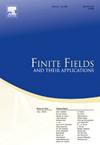Construction of MDS Euclidean self-dual codes via multiple subsets
IF 1.2
3区 数学
Q1 MATHEMATICS
引用次数: 0
Abstract
MDS self-dual codes have good algebraic structure, and their parameters are completely determined by the code length. In recent years, the construction of MDS Euclidean self-dual codes with new lengths has become an important issue in coding theory. In this paper, we are committed to constructing new MDS Euclidean self-dual codes via generalized Reed-Solomon (GRS) codes and their extended (EGRS) codes. The main effort of our constructions is to find suitable subsets of finite fields as the evaluation sets, ensuring that the corresponding (extended) GRS codes are Euclidean self-dual. Firstly, we present a method for selecting evaluation sets from multiple intersecting subsets and provide a theorem to guarantee that the chosen evaluation sets meet the desired criteria. Secondly, based on this theorem, we construct six new classes of MDS Euclidean self-dual codes using the norm function, as well as the union of three multiplicity subgroups and their cosets respectively. Finally, in our constructions, the proportion of possible MDS Euclidean self-dual codes exceeds 85%, which is much higher than previously reported results.
基于多子集的MDS欧几里德自对偶码的构造
MDS自对偶码具有良好的代数结构,其参数完全由码长决定。近年来,构造具有新长度的MDS欧几里得自对偶码已成为编码理论中的一个重要问题。在本文中,我们致力于通过广义Reed-Solomon (GRS)码及其扩展(EGRS)码构造新的MDS欧几里得自对偶码。我们构造的主要工作是找到合适的有限域子集作为评估集,确保相应的(扩展的)GRS码是欧几里得自对偶的。首先,提出了一种从多个相交子集中选择评价集的方法,并给出了一个保证所选评价集满足期望准则的定理。其次,在此定理的基础上,利用范数函数构造了6类新的MDS欧几里德自对偶码,并分别构造了3个多重子群及其余集的并。最后,在我们的结构中,可能的MDS欧几里得自对偶码的比例超过85%,远远高于先前报道的结果。
本文章由计算机程序翻译,如有差异,请以英文原文为准。
求助全文
约1分钟内获得全文
求助全文
来源期刊
CiteScore
2.00
自引率
20.00%
发文量
133
审稿时长
6-12 weeks
期刊介绍:
Finite Fields and Their Applications is a peer-reviewed technical journal publishing papers in finite field theory as well as in applications of finite fields. As a result of applications in a wide variety of areas, finite fields are increasingly important in several areas of mathematics, including linear and abstract algebra, number theory and algebraic geometry, as well as in computer science, statistics, information theory, and engineering.
For cohesion, and because so many applications rely on various theoretical properties of finite fields, it is essential that there be a core of high-quality papers on theoretical aspects. In addition, since much of the vitality of the area comes from computational problems, the journal publishes papers on computational aspects of finite fields as well as on algorithms and complexity of finite field-related methods.
The journal also publishes papers in various applications including, but not limited to, algebraic coding theory, cryptology, combinatorial design theory, pseudorandom number generation, and linear recurring sequences. There are other areas of application to be included, but the important point is that finite fields play a nontrivial role in the theory, application, or algorithm.

 求助内容:
求助内容: 应助结果提醒方式:
应助结果提醒方式:


